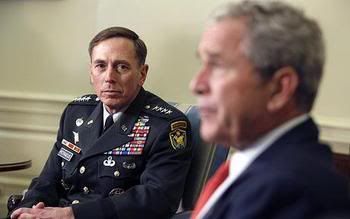“We used to say about Iraq that it was hard but not hopeless, there is similar sentiment about this. It is hard, but it’s certainly not hopeless.”

The General, with my favorite president!
I've always believed in General Petraeus and I always will. Iraq was much, much worse at its peak and the troops were able to turn it around! Remember when all the news that came out of Iraq were 100 dead people here, 150 dead people there? You don't get a lot of that from Afghanistan. There's still hope. I can completely understand why people are fed up- I mean, who isn't? It just never ends. But this is the Good War, this is the place where Osama Bin Laden planned 9/11. So many brave men and women have given their lives not only to free Afghanistan from tyranny, but to protect their loved ones back home. It's just wrong to let them die in vain. It's heartbreaking. (Click on the link below to read the article from World Blog!)
From World Blog:
KABUL – After nearly four decades of military service, Gen. David Petraeus will be trading in his combat pants for some slacks as he assumes his new role as the director of the CIA later this year.
As Petraeus packs his bags to leave Afghanistan for Washington he spoke with NBC News in a one-on-one interview about America’s wars in Iraq and Afghanistan.
It hasn’t been an easy year – or decade – for the general who is credited with helping turn the Iraq war around and was then tapped by President Barack Obama to do the same in Afghanistan. He has been unanimously confirmed by the U.S. Senate for his next big job as the Director of the Central Intelligence Agency and will turn over command of U.S. and NATO forces in Afghanistan on July 18.
In 2005, the then-lieutenant general worked on an Afghan war assessment stating that the mission would likely continue for many years to come pointing to various factors including the fact that the country had already suffered through three-decades of war, resulting in extreme poverty and enormous suffering. “There is extraordinary potential here but it's much more difficult to capitalize on, than in Iraq,” he said.
The success of the surge in Iraq was one of the reasons why Obama decided to implement a so-called “mini-surge” in Afghanistan announced in December 2009 – adding around 30,000 additional troops to the fight, bringing the number up to just over 100,000 U.S. boots on the ground.
Petraeus believes that the Taliban’s momentum has been reversed since those troops hit the ground, but says there is still work to be done. “It remains fragile and it does remain reversible – so this will take determination and steadfast purpose,” he said emphasizing that the Iraqi surge was not an exact blue print for Afghanistan. “I never felt that we could flip Afghanistan the way were able to flip Iraq through a variety of activities during the surge,” he said. And although Afghanistan has not been “flipped,” Petraeus does believe that there have been extraordinary improvements in many parts of the country.
“The situation here is very hard, without question, it has gotten progressively more difficult up until somewhere around last year – last fall – when we started taking back areas from the Taliban that matter enormously to them,” he said, including Mullah Omar’s hometown in Kandahar.
And while many Americans are frustrated by the ongoing level of violence in Afghanistan, Petraeus pointed out that the violence we are seeing in Afghanistan is nowhere near what was experienced in Iraq.
“Iraq was completely out of control in a way that I don’t think Afghanistan has ever been,” he said.
He pointed to the fact that in Iraq there were 220 attacks per day at the height of the violence compared to the 50 or 60 per day in Afghanistan at its peak. “The level of violence [in Iraq] was so horrific that you almost can’t imagine it now looking back.” As Iraq continues to improve, Petraeus believes that Afghanistan is on the right track as well, pointing to the fact that the country is about a week away from seven provinces and municipalities being handed over to complete Afghan control. “Afghanization is moving forward and that is indeed what we want to see happen over the course of the years between now and the end of 2014 when transition will be complete.”
As Petraeus prepares to leave Afghanistan he believes there can be success in what some see as the never ending war – once again pointing to lessons he learned in America’s other war.
“We used to say about Iraq that it was hard but not hopeless, there is similar sentiment about this. It is hard, but it’s certainly not hopeless.”

0 comments:
Post a Comment